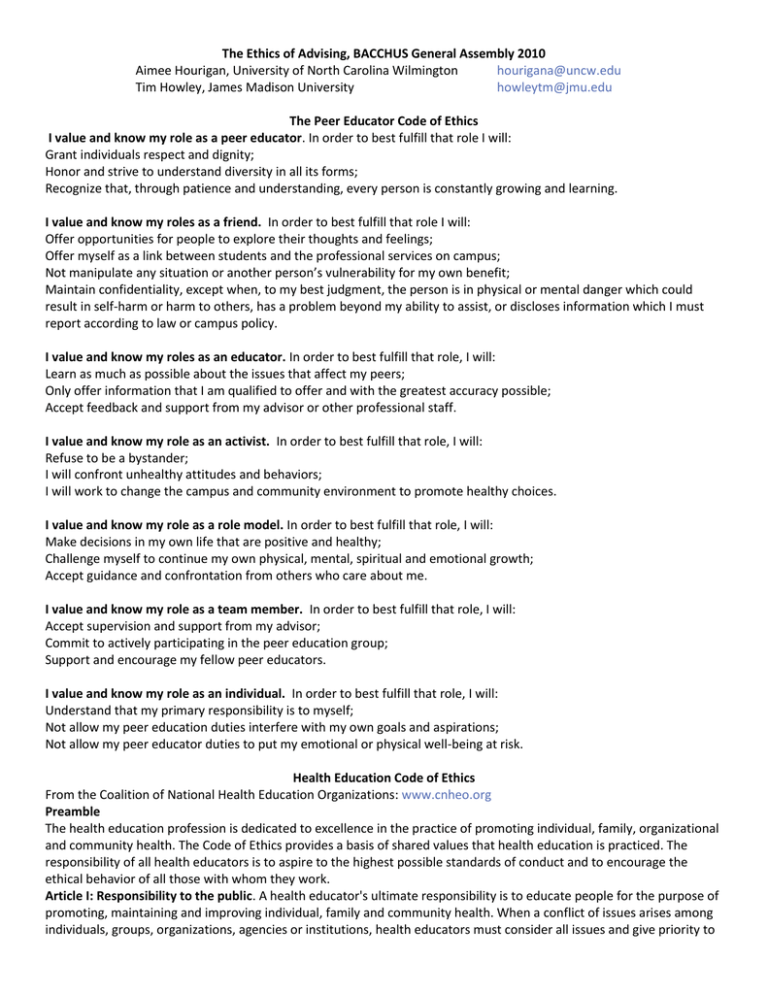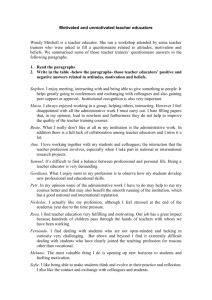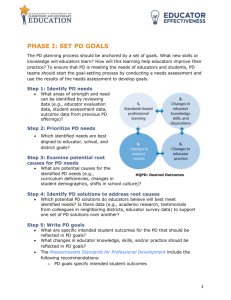The Ethics of Advising, BACCHUS General Assembly 2010
advertisement

The Ethics of Advising, BACCHUS General Assembly 2010 Aimee Hourigan, University of North Carolina Wilmington hourigana@uncw.edu Tim Howley, James Madison University howleytm@jmu.edu The Peer Educator Code of Ethics I value and know my role as a peer educator. In order to best fulfill that role I will: Grant individuals respect and dignity; Honor and strive to understand diversity in all its forms; Recognize that, through patience and understanding, every person is constantly growing and learning. I value and know my roles as a friend. In order to best fulfill that role I will: Offer opportunities for people to explore their thoughts and feelings; Offer myself as a link between students and the professional services on campus; Not manipulate any situation or another person’s vulnerability for my own benefit; Maintain confidentiality, except when, to my best judgment, the person is in physical or mental danger which could result in self-harm or harm to others, has a problem beyond my ability to assist, or discloses information which I must report according to law or campus policy. I value and know my roles as an educator. In order to best fulfill that role, I will: Learn as much as possible about the issues that affect my peers; Only offer information that I am qualified to offer and with the greatest accuracy possible; Accept feedback and support from my advisor or other professional staff. I value and know my role as an activist. In order to best fulfill that role, I will: Refuse to be a bystander; I will confront unhealthy attitudes and behaviors; I will work to change the campus and community environment to promote healthy choices. I value and know my role as a role model. In order to best fulfill that role, I will: Make decisions in my own life that are positive and healthy; Challenge myself to continue my own physical, mental, spiritual and emotional growth; Accept guidance and confrontation from others who care about me. I value and know my role as a team member. In order to best fulfill that role, I will: Accept supervision and support from my advisor; Commit to actively participating in the peer education group; Support and encourage my fellow peer educators. I value and know my role as an individual. In order to best fulfill that role, I will: Understand that my primary responsibility is to myself; Not allow my peer education duties interfere with my own goals and aspirations; Not allow my peer educator duties to put my emotional or physical well-being at risk. Health Education Code of Ethics From the Coalition of National Health Education Organizations: www.cnheo.org Preamble The health education profession is dedicated to excellence in the practice of promoting individual, family, organizational and community health. The Code of Ethics provides a basis of shared values that health education is practiced. The responsibility of all health educators is to aspire to the highest possible standards of conduct and to encourage the ethical behavior of all those with whom they work. Article I: Responsibility to the public. A health educator's ultimate responsibility is to educate people for the purpose of promoting, maintaining and improving individual, family and community health. When a conflict of issues arises among individuals, groups, organizations, agencies or institutions, health educators must consider all issues and give priority to those that promote wellness and quality of living through principles of self-determination and freedom of choice for the individual. Article II: Responsibility to the profession. Health educators are responsible for their professional behavior, for the reputation of their profession, and for promoting ethical conduct among their colleagues. Article III : Responsibility to employers. Health educators recognize the boundaries of their professional competence and are accountable for their professional activities and actions. Article IV: Responsibility in the delivery of health education. Health educators promote integrity in the delivery of health education. They respect the rights, dignity, confidentiality and worth of all people by adapting strategies and methods to meet the needs of diverse populations and communities. Article V: Responsibility in research and evaluation. Health educators contribute to the health of the population and to the profession through research and evaluation activities. When planning and conducting research or evaluation, health educators do so in accordance with federal and state laws and regulations, organizational and institutional policies, and professional standards. Article VI: Responsibility in professional preparation. Those involved in the preparation and training of health educators have an obligation to accord learners the same respect and treatment given other groups by providing quality education that benefits the profession and the public. ACPA STATEMENT OF ETHICAL PRINCIPLES AND STANDARDS Full document at: www2.myacpa.org/au/documents/Ethical_Principles_Standards.pdf ACPA members are committed to contributing to the comprehensive education of students, protecting human rights, advancing knowledge of student growth and development, and promoting the effectiveness of institutional programs, services, and organizational units. As a means of supporting these commitments, members of ACPA subscribe to the following principles and standards of ethical conduct. Professional Responsibility and Competence. Student affairs professionals are responsible for promoting and facilitating student learning about students and their world, enhancing the quality and understanding of student life, advocating for student welfare and concerns, and advancing the profession and its ideals. They possess the knowledge, skills, emotional stability, and maturity to discharge responsibilities as administrators, advisors, consultants, counselors, programmers, researchers, and teachers. High levels of professional competence are expected in the performance of their duties and responsibilities. Student affairs professionals are responsible for the consequences of their actions or inaction. Student Learning and Development. Student development is an essential purpose of higher education. Support of this process is a major responsibility of the student affairs profession. Development is complex and includes cognitive, physical, moral, social, emotional, career, spiritual, personal, and intellectual dimensions. Professionals must be sensitive to and knowledgeable about the variety of backgrounds, cultures, experiences, abilities, personal characteristics and viewpoints evident in the student population and be able to incorporate appropriate theoretical perspectives to identify learning opportunities and to reduce barriers to development. Multicultural competence is a fundamental element of ethical practice. Responsibility to the Institution. Institutions of higher education provide the context for student affairs practice. Institutional mission, goals, policies, organizational structure, and culture, combined with individual judgment and professional standards, define and delimit the nature and extent of practice. Student affairs professionals share responsibility with other members of the academic community for fulfilling the institutional mission. Responsibility to promote the development of students and to support the institution’s policies and interests require that professionals balance competing demands. Responsibility to Society. Student affairs professionals, both as citizens and practitioners, have a responsibility to contribute to the improvement of the communities in which they live and work and to act as advocates for social justice for members of those communities. They respect individuality and individual differences. They recognize that our communities are enhanced by social and individual diversity manifested by characteristics such as age, culture, class, ethnicity, gender, ability, gender identity, race, religion, and sexual orientation. Student affairs professionals work to protect human rights and promote respect for human diversity in higher education.




